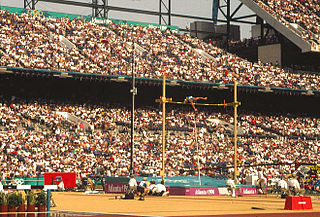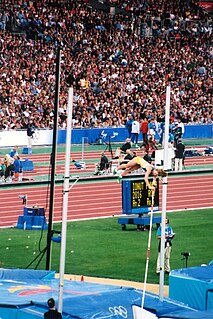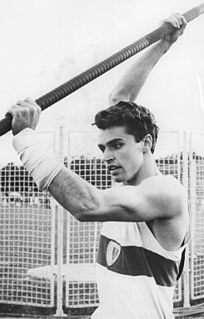
Sergey Nazarovych Bubka is a Soviet and Ukrainian former pole vaulter. He represented the Soviet Union until its dissolution in 1991. Bubka was twice named Athlete of the Year by Track & Field News, and in 2012 was one of 24 athletes inducted as inaugural members of the International Association of Athletics Federations Hall of Fame.
The men's pole vault competition at the 2004 Summer Olympics in Athens was held at the Olympic Stadium on 25–27 August. Thirty-nine athletes from 25 nations competed. The event was won by Timothy Mack of the United States, the nation's 18th victory in the men's pole vault. Toby Stevenson took silver, making it the second consecutive Games that Americans finished 1st and 2nd. Giuseppe Gibilisco's bronze was Italy's first medal in the event.

Jean Galfione is a retired, French pole vaulter. During his pole vaulting career, he won at least one medal in each of the following major international competitions - the Olympic Games, the World Championships, the World Indoor Championships, the European Championships and the European Indoors Championships

Thierry Vigneron is a retired French pole vaulter. In the 1980s, he was among the world's leading pole vaulters. He broke the world record in the event four times and was the last man to hold the world record before Sergey Bubka, who would hold on to it almost 30 years until February 2014.
Radion Aksanovich Gataullin is a retired pole vaulter who represented the Soviet Union and later Russia. He is the 1988 Olympic silver medallist, the 1987 World bronze medallist, a two-time European champion (1990/94) and a two-time World Indoor champion (1989/93). He is also a former world indoor record holder with clearances of 6.00m and 6.02m in 1989.

Steven Leslie Hooker OAM is an Australian former pole vaulter and Olympic gold medalist. His personal best, achieved in 2008, is 6.06 m making him the fourth-highest pole vaulter in history, behind Sergey Bubka and Renaud Lavillenie and Armand Duplantis.

The men's pole vault was an event at the 1996 Summer Olympics in Atlanta, Georgia. Thirty-seven athletes from 24 nations competed. The maximum number of athletes per nation had been set at 3 since the 1930 Olympic Congress. The event was won by Jean Galfione of France, the nation's second victory in the event. Igor Trandenkov took silver, the first medal for Russia in the pole vault. Similarly, Andrei Tivontchik's bronze was the first for Germany, though both East Germany and West Germany as well as the Unified Team of Germany had previously won medals.

The men's pole vault was an event at the 1952 Summer Olympics in Helsinki, Finland. Twenty-eight athletes from 18 nations competed. The maximum number of athletes per nation had been set at 3 since the 1930 Olympic Congress. The final was held on Tuesday July 22, 1952. The event was won by Bob Richards of the United States, the nation's 12th consecutive victory in the men's pole vault. Another American, Don Laz, took silver. Ragnar Lundberg's bronze was Sweden's first medal in the event since 1912.

The Men's Pole Vault was an event at the 1992 Summer Olympics in Barcelona, Spain. There were a total number of 34 participating athletes from 23 nations. The maximum number of athletes per nation had been set at 3 since the 1930 Olympic Congress. The qualification mark was set at 5.60 metres.

The men's pole vault event at the 1984 Summer Olympics in Los Angeles, California had an entry list of 19 competitors from 13 nations, with two qualifying groups before the final (12) took place on Wednesday August 8, 1984. The maximum number of athletes per nation had been set at 3 since the 1930 Olympic Congress. The event was won by Pierre Quinon of France, the nation's first medal in the men's pole vault. France also took one of the two bronze medals after Thierry Vigneron tied with Earl Bell of the United States for third. Mike Tully, also American, earned silver. Bell and Tully continued the American streak of podium appearances in the event every time the United States competed.

The men's pole vault at the 2008 Summer Olympics took place on 20 and 22 August at the Beijing National Stadium. Thirty-eight athletes from 25 nations competed. The event was won by Steven Hooker of Australia, the nation's first medal in the men's pole vault. Russia took its third medal of the four Games since competing independently; including Russian vaulters for the Soviet Union and Unified Team, Russians had taken six medals in the last six Games. The bronze medal initially went to Denys Yurchenko of Ukraine, but was later stripped from him and reassigned to Derek Miles of the United States.

The men's pole vault event at the 1980 Summer Olympics in Moscow, Soviet Union had an entry list of 19 competitors from 10 nations. The maximum number of athletes per nation had been set at 3 since the 1930 Olympic Congress. The final was held on Wednesday July 30, 1980. The top twelve and ties and all those clearing 5.40 metres advanced to the final. The event was won by Władysław Kozakiewicz of Poland, the nation's second consecutive victory in the men's pole vault. His countryman Tadeusz Ślusarski, who had won the event four years earlier, became the fifth man to earn two medals in the event when he finished in a tie for silver. The other silver went to Konstantin Volkov and was the Soviet Union's first pole vault medal.

Renaud Lavillenie is a French pole vaulter. Lavillenie won the gold medal at the 2012 Olympics in London and the silver medal at the 2016 Olympics in Rio. In addition to his Olympic success, he has won three World Indoor Championships gold medals (record), three European Championships gold medals and four European Indoor Championships gold medals. He has also won one silver medal and four bronze medals at the World Championships. As of 25 August 2016, he holds the French national records for the highest pole vault clearance both outdoors and indoors. The 6.16 was the absolute world record for the pole vault for over 6 years, 2014–2020. He was the pole vault overall winner of the IAAF Diamond League in seven consecutive years, from 2010 to 2016.

The men's pole vault event at the 2000 Summer Olympics as part of the athletics program was held at the Olympic Stadium on Wednesday, 27 September and Friday, 29 September. Thirty-six athletes from 22 nations competed. The maximum number of athletes per nation had been set at 3 since the 1930 Olympic Congress. The event was won by Nick Hysong of the United States, the nation's first victory in the event since its 16-Games streak ended. The American team also took silver, as Lawrence Johnson finished second. Maksim Tarasov became the seventh man to win multiple pole vault medals, and the second to do so under two different flags, adding a bronze to his 1992 gold.

The men's pole vault event was part of the track and field athletics programme at the 1936 Summer Olympics. The competition was held on August 5, 1936. Thirty athletes from 21 nations competed. The maximum number of athletes per nation had been set at 3 since the 1930 Olympic Congress. The final was won by Earle Meadows of the United States. It was the nation's tenth consecutive victory in the men's pole vault.

The men's pole vault was a competition at the 2012 Summer Olympics in London, United Kingdom. The event was held at the Olympic Stadium on 8–10 August. Thirty-two athletes from 23 nations competed. The event was won by Renaud Lavillenie of France, the nation's first victory in the event since 1996 and third overall. Björn Otto and Raphael Holzdeppe of Germany took silver and bronze, respectively; like France, it was the first time since 1996 that Germany reached the men's pole vault podium.

The men's pole vault field event at the 1972 Olympic Games took place on September 1 & 2. Twenty-one athletes from 12 nations competed. The maximum number of athletes per nation had been set at 3 since the 1930 Olympic Congress. The event was won by Wolfgang Nordwig of East Germany, the first non-American to win the event. Nordwig and silver medalist Bob Seagren were the third and fourth men to win multiple medals in the event.

The men's pole vault competition featured in the athletics programme at the 1976 Summer Olympics and was held at the Olympic Stadium in Montréal on 24 and 26 July. Twenty-seven athletes from 13 nations competed. The maximum number of athletes per nation had been set at 3 since the 1930 Olympic Congress.

The men's pole vault was one of four men's jumping events on the athletics program at the 1968 Summer Olympics. The competition had two rounds, qualifying and a final, which were held on 14 and 16 October respectively at the Estadio Olímpico Universitario in Mexico City. Twenty-three athletes from 15 nations competed. The maximum number of athletes per nation had been set at 3 since the 1930 Olympic Congress. The event was won by Bob Seagren of the United States, the nation's 16th consecutive victory in the men's pole vault. Claus Schiprowski of West Germany took silver, while Wolfgang Nordwig of East Germany took bronze—the first medals for each of those nations as separate teams, though two West German vaulters had earned silver and bronze for the United Team of Germany in 1964.
The men's pole vault competition at the 2016 Summer Olympics in Rio de Janeiro, Brazil. The event was held at the Olympic Stadium between 13–15 August. Thirty-one athletes from 16 nations competed. Thiago Braz da Silva of Brazil won the gold medal, the nation's first medal in the men's pole vault. Renaud Lavillenie of France was unable to successfully defend his 2012 gold, but became the seventh man to win two medals with silver this time. Sam Kendricks's bronze returned the United States to the podium after a one-Games absence.
















